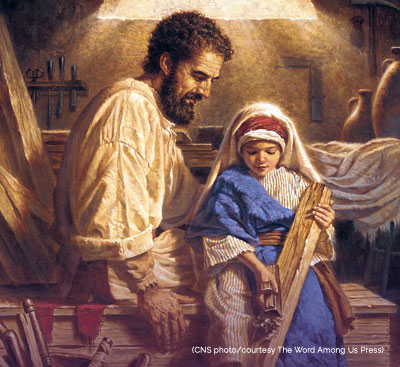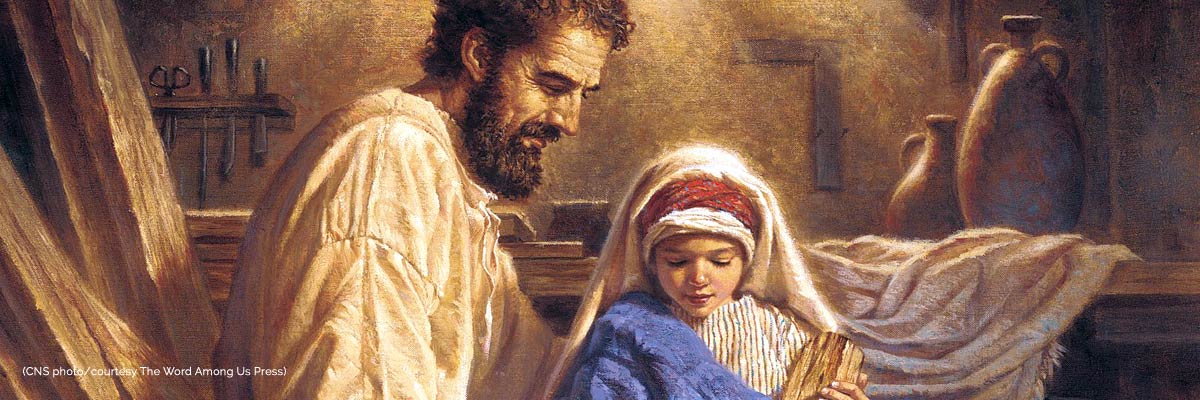Official Website of the
Catholic Diocese of Little Rock
Pope: Turn to St. Joseph in troubled times
Published: March 16, 2021
“If a person cannot find anyone to teach him how to pray, let him take this glorious saint for his guide, and he will not lose his way.” — St. Teresa of Avila referring to St. Joseph
We celebrate the Solemnity of St. Joseph, husband of the Blessed Virgin Mary on March 19. St. Joseph, husband of Mary, the mother of Jesus, and legal father of Jesus according to Jewish law, is a model of humility and obedience to God’s will. Pope Francis declared a year dedicated to St. Joseph on Dec. 8, 2020, which was the 150th anniversary of St. Joseph being declared patron of the universal Church. It continues through Dec. 8, 2021.
"With a father’s heart: That is how Joseph loved Jesus," the Holy Father explained in his apostolic letter, "Patris Corde" ("With a Father's Heart"). The pope also offered personal reflections on how St. Joseph is like the "ordinary people" who have been our heroes during the COVID-19 pandemic.
"Each of us can discover in Joseph — the man who goes unnoticed, a daily, discreet and hidden presence — an intercessor, a support and a guide in times of trouble. St. Joseph reminds us that those who appear hidden or in the shadows can play an incomparable role in the history of salvation," Pope Francis added.
 Our Sunday Visitor and the U.S. Conference of Catholic Bishops offer lots of resources to help you celebrate this year. And the Apostolic Penitentiary, a Vatican tribunal that deals with matters of conscience, also issued a decree Dec. 8, 2020, that plenary indulgences will be granted to Catholics not only through prayer and penance, but also through acts of justice, charity and piety dedicated to St. Joseph. The normal conditions for receiving an indulgence, which include having a spirit detached from sin, receiving sacramental confession and Communion as soon as possible and praying for the Holy Father's intentions apply.
Our Sunday Visitor and the U.S. Conference of Catholic Bishops offer lots of resources to help you celebrate this year. And the Apostolic Penitentiary, a Vatican tribunal that deals with matters of conscience, also issued a decree Dec. 8, 2020, that plenary indulgences will be granted to Catholics not only through prayer and penance, but also through acts of justice, charity and piety dedicated to St. Joseph. The normal conditions for receiving an indulgence, which include having a spirit detached from sin, receiving sacramental confession and Communion as soon as possible and praying for the Holy Father's intentions apply.
Though he is rarely mentioned in the Bible, the Church has seen St. Joseph as a role model and guide for centuries. Before Pope Francis, St. Pope John Paul II highlighted St. Joseph to explain the Catholic understanding of fatherhood in his 1989 apostolic exhortation, "Redemptoris Custos" ("Guardian of the Redeemer: On the Person and Mission of St. Joseph in the Life of Christ and the Church").
Though the feast of St. Joseph is a solemnity, which is the highest rank of liturgical celebrations, it is not a holy day of obligation. This year it falls on a Friday of Lent. And since it is a solemnity, the normal requirement to abstain from meat, is lifted on that day. According to the Code of Canon Law, "Abstinence from meat, or from some other food as determined by the Episcopal Conference, is to be observed on all Fridays, unless a solemnity should fall on a Friday." (cannon, 1251)
Some might wonder why this exception doesn't extend to St. Patrick's Day when it falls on a Friday of Lent. Father Erik Pohlmeier, director of faith formation for the Diocese of Little Rock, said the reason is because St. Patrick's Day is not a solemnity, it is an optional memorial, which is the second lowest rank of liturgical celebration, "which is why it takes special permission from the bishop to change anything on that day." The feast of St. Joseph, "even on a Friday should be treated as a Sunday," he added.
But "whatever you do, make sure to observe the 'spirit' of the law and celebrate the life of St. Joseph when you eat meat on Friday. Offer him your thanksgiving and pledge to live a holy and virtuous life," advised Philip Kosloski in Aleteia.
A popular tradition on St. Joseph feast day is the St. Joseph Altar or St. Joseph Table. Arkansas Catholic describes the tradition in parishes and organizations in our diocese. There are several online resources to help you put together this celebration at home, including: "St. Joseph Altar For Beginners," "Foods for St. Joseph's Altar" and a "Blessing of the Saint Joseph Altar."




